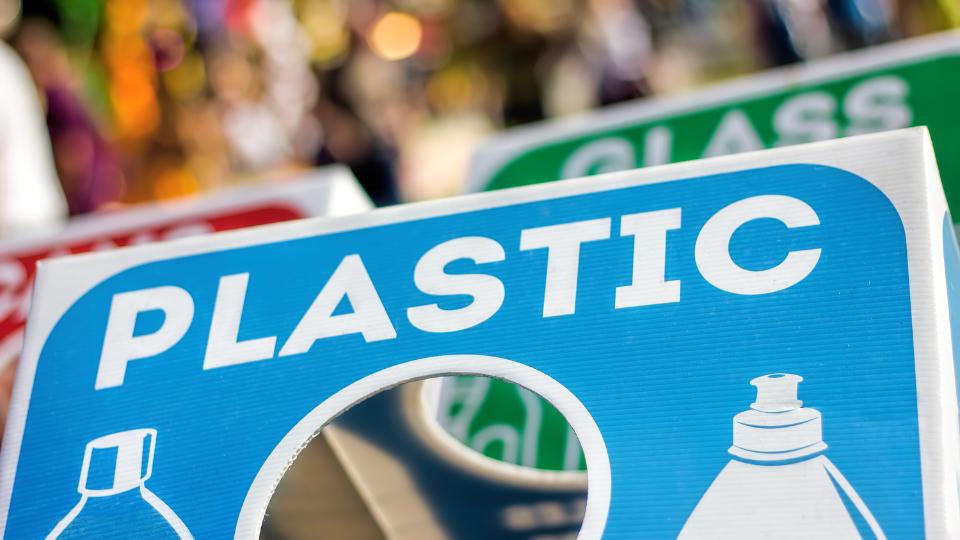
Picture this: you’re at a festival, surrounded by the beats of music, vibrant colours, and the aroma of delicious food filling the air.
It’s a magical moment… until you realise that you’re knee-deep in a sea of discarded hot dog wrappers, glitter bombs, and mysterious objects that could have come from Mars for all you know.
It’s no surprise, that festival waste management is a big priority for events hosts this summer. This guide explores everything you need to know about festivals and campsite waste.
Table of contents
- Festival waste statistics
- Littering at Glastonbury
- Are vapes banned from Glastonbury?
- What services do we offer for festival waste management?
Festival waste statistics
- Each year, an estimated 250,000 tents are abandoned at festivals across the UK.
- In 2019, approximately 875,000 plastic cups were discarded at a single major music festival in the UK.
- Festival-goers in the UK collectively discard around 1.3 million food containers during the festival season.
- On average, over 2 million plastic bottles are used and discarded at festivals in the UK annually.
- A staggering 90% of single-use plastic items, such as straws and cutlery, used at festivals end up as litter.
- Festival waste contains an average of 20% recyclable materials, such as paper, cardboard, and plastics.
- The volume of litter left behind at festivals in the UK is equivalent to approximately 8,000 wheelie bins per festival.
- It is estimated that festival-goers discard around 1 million non-recyclable wristbands each year.
- Over 40% of festival waste consists of cigarette butts, creating a significant litter and environmental hazard.
- In 2018, more than 80 tonnes of abandoned clothing were collected after a single UK music festival.
- The clean-up of festival sites can take up to six weeks and require a dedicated team of workers.
- Festival waste management costs the UK around £10 million per year.
- Approximately 60% of festival litter is left behind on the final day of the event.
- The average festival-goer produces over 8 kilograms of waste per day, primarily comprising food packaging and drink containers.
- A study revealed that 95% of festival-goers witnessed littering behaviours during festivals.
- Despite the availability of recycling bins, only 20% of festival waste is actually recycled.
- Festival litter, particularly plastic waste, poses a significant threat to marine life when it enters waterways and eventually reaches the oceans.
- The use of pyrotechnics and fireworks at festivals results in a large amount of non-biodegradable debris.
- In 2020 it was reported that 23,500 tonnes of waste had been generated over the year at music festivals alone in the UK.
- During a survey at Glastonbury, it was reported that 58% of people claimed to have lost, left or broken items at festivals even though over 80% had claimed they bought new items specifically for the festival.
How big a problem are single-use tents?
Comp-A-Tent found that 77% of camping tents used at festivals are abandoned which generates a whopping 900 tonnes of waste that can’t be recycled or repurposed.
This data was taken from over 50,000 festival goers which shows the true scale of the issue.

Littering at Glastonbury
Litter at the Glastonbury Festival has been a concern in the past due to the large number of attendees and the temporary nature of the event. However, the festival organisers, in collaboration with attendees, have taken significant steps to reduce litter and promote a clean and environmentally friendly festival experience.
Here are some of the initiatives that have been implemented:
Increased Waste Management
The festival organisers have made efforts to enhance waste management systems on the site.
They provide a substantial number of recycling bins and waste containers throughout the festival grounds, ensuring that attendees have convenient options for disposing of their waste properly.
Eco-Cups and Bottle Refill Stations
Glastonbury has introduced eco-cups and bottle refill stations as part of their commitment to reducing single-use plastic waste.
Festival-goers are encouraged to use reusable cups for drinks, minimising the amount of plastic cups discarded. Additionally, refill stations are strategically placed around the site to encourage attendees to refill their water bottles instead of purchasing single-use plastic bottles.
Education and Awareness
Glastonbury Festival recognises the importance of educating attendees about the impact of littering on the environment.
They provide information through various channels, including on-site signage, digital platforms, and leaflets, raising awareness about responsible waste management and the importance of keeping the festival grounds clean.
Dedicated Cleanup Crews
The festival employs a dedicated team of cleanup crews who work tirelessly throughout the event to maintain cleanliness. These crews are responsible for waste collection, emptying bins, and keeping the site clean and litter-free.
Volunteer Involvement
Glastonbury Festival encourages volunteer participation in waste management initiatives.
Volunteers play a vital role in promoting cleanliness and sustainability by assisting in waste sorting, recycling, and litter cleanup.
Collaboration with Environmental Organisations
The festival collaborates with various environmental organisations and charities to implement sustainable practices and initiatives.
These partnerships help raise awareness, share best practices, and promote environmental stewardship among attendees.
To further reduce litter at Glastonbury and other festivals, attendees can take the following steps:
- Pack Smart: Bring reusable water bottles, food containers, and bags to minimise the generation of waste during the festival.
- Use Recycling Facilities: Make use of the provided recycling bins and waste receptacles to ensure that waste is properly sorted and recycled.
- Take Responsibility: Be mindful of personal waste and dispose of it in the designated bins. Encourage others to do the same and engage in conversations about the importance of keeping the festival grounds clean.
- Participate in Cleanup Activities: Get involved in volunteer cleanup activities organised by the festival or join initiatives that promote environmental stewardship. Participating in cleanup efforts can create a positive impact and help maintain a clean environment for everyone.
By implementing these measures and encouraging responsible behaviour from both festival organisers and attendees, the Glastonbury Festival continues to make progress in reducing litter and promoting a sustainable event.
Are vapes banned from Glastonbury?
Glastonbury is now one of the first festivals in the UK to add disposable vapes to the “what not to bring” list along with non-biodegradable body glitter, wipes, and excess packaging.
This is due to the increased risk of damage that disposable vapes pose.
They run the risk of leaking harmful materials within the batteries into the ground and can even be combustible as many unfortunate waste management facilities have learned the hard way when the devices ignited other waste materials causing devastating fires.
What services do we offer for festival waste management?
Cardboard Cup Bins
Festivals often generate a significant amount of waste from disposable cardboard cups.
To address this issue, we provide specialised bins exclusively for collecting and recycling cardboard cups.
By diverting these cups from general waste, we contribute to reducing the environmental impact of festivals.

Plastic Cup Bins
Plastic cups are another major waste stream at festivals.
We offer dedicated bins for collecting and recycling plastic cups, allowing event organisers to minimise the amount of plastic waste sent to landfills.
Our aim is to encourage the use of reusable cups and promote a circular economy mindset within the festival industry.
Food Waste Bins for Festival Waste Management
Food waste is a significant concern at festivals due to the large quantities of food consumed and disposed of.
By composting or converting food waste into energy, we contribute to reducing greenhouse gas emissions and promote sustainable waste management practices.

Glass Waste Bins
Glass bottles and containers are commonly found at festivals.
Our glass waste bins are designed to safely collect and recycle glass waste.
By diverting glass from general waste, we help conserve resources and minimise the environmental impact associated with glass production.
Sanitary Waste Bins
Sanitary waste doesn’t stop for festivals!
Get in touch if you’d like to find out more about our sanitary waste bins.
You can also read more about how to prepare for sanitary waste at events in our dedicated guide.







